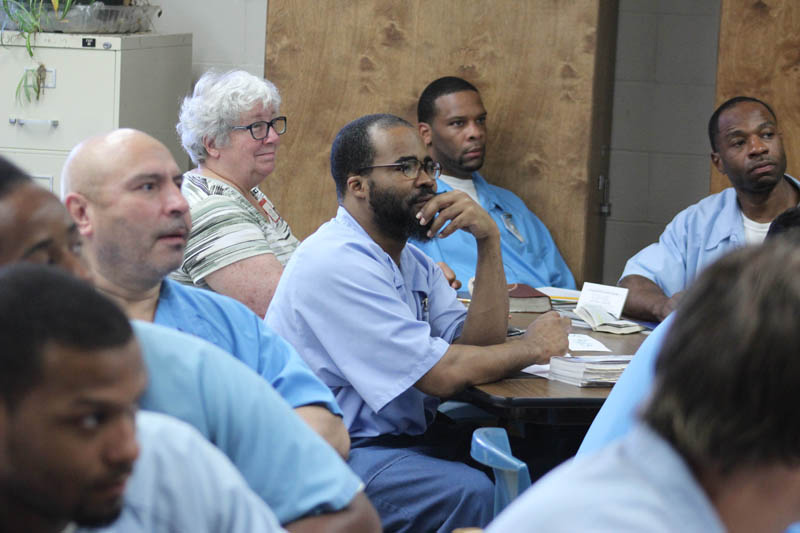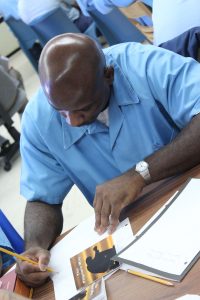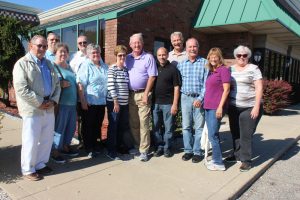Taking Cursillo into prisons not just a work of mercy, it’s a work of love

More than 50 men at the Danville Correctional Center took the opportunity to participate in the Cursillo weekend in September. Many of them were committed Christians who were well-versed in the Bible, which team members found humbling and inspiring. (The Catholic Post/Jennifer Willems)
DANVILLE — Driving to the Danville Correctional Center with a Cursillo team recently, Laura Mohrbacher admits to feeling some apprehension. Prisons always seemed like dark, dangerous places and she had no intention of going into one — even for Cursillo.
God kept tapping her on the shoulder, however, asking her to think about it.
Since God thought it was something she needed to do, she agreed to be on the second Cursillo team to go the correctional center in as many years.
She’s glad she did.

Jeffrey Price reflects on what he will take away from a Cursillo weekend presented at the Danville Correctional Center in September. (The Catholic Post/Jennifer Willems)
“I discovered that the men who attended are hungry for God’s unconditional love; to know that no matter what they have done, God will continue to love them,” she shared in a meditation she wrote after the weekend. “Prisoners are no longer faceless people who did wrong. They are fellow children of God searching for reassurance that they have value and are worth the time to share God’s love with them.”
A member of Holy Cross Parish in Champaign, where her husband Ed ministers as a permanent deacon, Mohrbacher was one of 14 people from around the diocese who helped present the weekend. They worked with 53 men — and there was a waiting list.
There are eight state correctional centers and one federal prison within the boundaries of the Diocese of Peoria — more than any other diocese in Illinois, according to Deacon Joe LaHood, longtime coordinator of prison ministry for the diocese. Much of that ministry is done through Cursillo, which is active in many of the prisons.
Deacon LaHood serves as spiritual director for these weekends.
Not only is “visiting the imprisoned” a corporal work of mercy, but experiences like Cursillo are a form of evangelization, he told The Catholic Post.
“Cursillo shows them there is forgiveness, there is mercy, there is a loving God,” he said.
Before the Year of Mercy ends, Pope Francis will also reach out to the imprisoned and their families when he celebrates a Jubilee for Prisoners. Planned for Sunday, Nov. 6, at St. Peter’s Basilica in Rome, the day of prayer also includes prison employees and chaplains.
BUILDING COMMUNITY
Cursillo is a Spanish word for “short course” and is designed to be a short course in Christianity. While based on Catholic principles, the spiritual renewal program is open to people of all faiths.
The process is the same, whether it’s a “street” Cursillo or prison Cursillo, although weekends in the correctional center are subject to change in order to accommodate the schedule of the facility and the candidates, LaHood said.
The goal is to build a community of local volunteers that can provide Cursillo and follow up with regular gatherings known as Ultreyas so people won’t have to travel so far. The September weekend in Danville, for example, drew team members from as far away as Elmwood and Canton. LaHood serves at Holy Family in Peoria.
“When we went to Danville last year, the team paid $8,000 of their own money for hotels, gas and meals,” he said. “That’s the commitment they have — not just their time but their money.”

The Cursillo team that went into the Danville Correctional Center in September came from all over the diocese to reassure the residents of God’s love for them. (The Catholic Post/Jennifer Willems)
Cassie Conklin, a member of St. Mary Parish in Kickapoo said those sacrifices are worth it.
“You see so much hope there. I don’t think we see hope every day and to see hope in a real way is very rewarding,” she said. While she had been on many Cursillo teams, this was the first time in a prison setting.
“There was a lot of love and a lot of hope in that room,” she said.
“The prisoners want people to come in and talk to them about Christ,” said Steve Conklin, Cassie’s brother and the rector for the Danville Cursillo weekend. He is a member of St. Patrick Parish in Elmwood and has been involved in prison ministry at the Illinois River Correctional Center in Canton for six years.
“They realize they’ve made some mistakes, but they don’t think God will forgive them,” he said. “They think God doesn’t love them or anybody likes them. We try to offer hope.”
Part of that hope is giving them a community they’ve never had before, the volunteers said.
“In this ministry, you form a community,” Cassie Conklin explained. “In street Cursillo, especially among women, you have a lot in common — we’re mothers, we’re daughters and we can celebrate that.
“In prison, they become more of a number,” she said. “This is one way they joined together as a community, worshipping God.”
MORE THAN A NUMBER
What they’re offered is the message that God does love them and does forgive them, she said.
“They may be shunned from society, but I think it was a wake-up call to some of them that they were a person again and not a number,” Cassie said, adding that this takes the fear out of the interaction for all concerned. “We’re all a big family.”
“Prisoners are no longer faceless people who did wrong. They are fellow children of God searching for reassurance that they have value and are worth the time to share God’s love with them.”
Jeffrey Price, one of the residents at Danville Correctional Center, learned that during the weekend.
“This experience has certainly been enlightening,” he told The Post. “There are a lot of guys here I never shook hands with before,” but they found that connection possible during Cursillo. He said he appreciated the fellowship, the community and the love.
Father Steve Loftus, pastor of Holy Family in Danville, goes to the correctional center every Tuesday to celebrate Mass and hear confessions. He also offers instruction to those who want to become Catholic and received two men into the church in April.
In addition, community volunteers lead a Bible study there every Saturday morning.
“I find the Catholic laypeople are really interested I don’t even have to ask them – they come to me,” he told The Post.
“I always think of something Fulton Sheen said when he went into prisons: ‘There’s one difference between you and I — you got caught; I didn’t,’” said Father Loftus, who has been involved in prison ministry since his seminary days.
He said the most important thing he brings them is Jesus — Light in a dark place.
Marilou Gervacio, who is on the staff of the Catholic Conference of Illinois and coordinates the Illinois Catholic Prison and Jail Ministry Network, said it is important that this continues to happen.
“One thing our prison ministers always stress when we talk about issues is that the people they are ministering to are part of our faith, they’re part of our faith community, and they have the same spiritual need we all do as Catholics,” she said. “We try and stress that it is such an important ministry and for the parishes and the dioceses to support that.”





